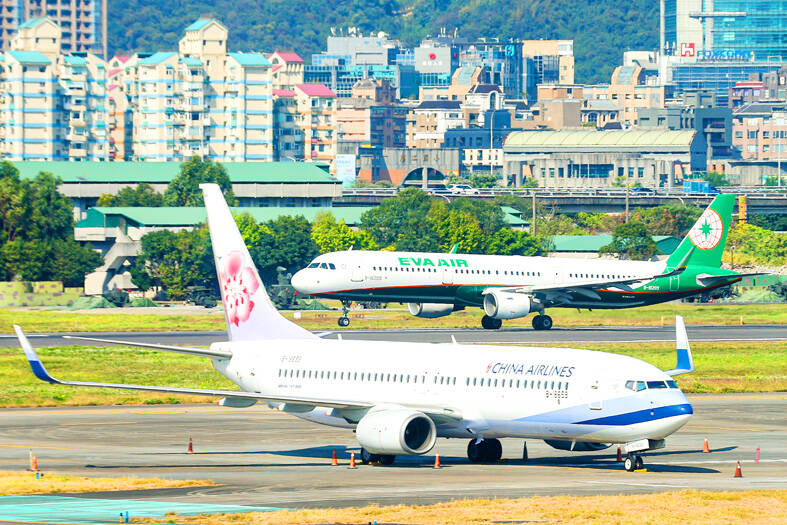China Airlines Ltd (CAL, 中華航空) and EVA Airways Corp (長榮航空) have reported their highest-ever net profit for the first half of the year amid a boom in international travel and growing demand for cargo services.
The global airline industry’s momentum from last year extended into the first six months of this year. That momentum along with an increase in the number of flights supported passenger revenue growth, the two airlines said on Friday.
CAL’s net profit in the first six months of this year hit a new high of NT$7.14 billion (US$220 million), resulting in earnings per share of NT$1.08, the airline said.

Photo: CNA
Revenue generated from passenger flights rose by 17.01 percent from a year earlier to NT$64.68 billion in the January-to-June period, with Northeast Asia, Southeast Asia and North America as the top three sources of revenue, CAL said.
Cargo services were affected by high inflation, interest rate hikes and inventory adjustments in the industrial sector in the early part of the first quarter, the airline said.
However, the situation improved in the second quarter as demand picked up, boosting freight rates and leading cargo revenue to rise 19.98 percent from a year earlier, for the first half of the year, it said.
CAL was also upbeat about its prospects in the second half and said it expects its number of flights to increase by 25 percent this year, citing strong demand for passenger flights during the summer.
Cargo services are also expected to continue to grow in the second half and with all 10 of its Boeing Co 777F cargo planes set to join the CAL fleet this year, the carrier said it is hoping to further capitalize on opportunities in the cargo charter flight market.
EVA’s net profit during the January-to-June period also hit a record high of NT$13.38 billion, resulting in an EPS of NT$2.31, the airline said.
In the six-month period, revenue generated from its passenger flight division rose 17.9 percent from a year earlier to NT$72.9 billion, while its cargo services revenue increased by 17.4 percent from last year to NT$22.95 billion, EVA said.
EVA said cargo volume in the first half of the year rose 15.4 percent from a year earlier thanks to growing demand for artificial intelligence applications, an increase in space demand from Chinese e-commerce operators and port congestion, which led some vendors to have items delivered by air rather than sea.
Separately, Starlux Airlines Co (星宇航空) last week won permission to list its shares on the Taiwan Stock Exchange and said it intended to make its main board debut by the end of this year.
Starlux, which trades its shares on the Emerging Stock Board, turned a profit for the first time last year, with a net profit of NT$149 million and EPS of NT$0.08. It reported NT$620 million in net profit and EPS of NT$0.3 for the first quarter of this year.
The carrier has not reported its first-half earnings yet, but its consolidated sales for the first six months rose 65 percent from a year earlier to NT$16.33 billion, boosted by growing revenue from passenger flights and cargo services.

Application-specific integrated circuit designer Faraday Technology Corp (智原) yesterday said that although revenue this quarter would decline 30 percent from last quarter, it retained its full-year forecast of revenue growth of 100 percent. The company attributed the quarterly drop to a slowdown in customers’ production of chips using Faraday’s advanced packaging technology. The company is still confident about its revenue growth this year, given its strong “design-win” — or the projects it won to help customers design their chips, Faraday president Steve Wang (王國雍) told an online earnings conference. “The design-win this year is better than we expected. We believe we will win

Intel Corp chief executive officer Lip-Bu Tan (陳立武) is expected to meet with Taiwanese suppliers next month in conjunction with the opening of the Computex Taipei trade show, supply chain sources said on Monday. The visit, the first for Tan to Taiwan since assuming his new post last month, would be aimed at enhancing Intel’s ties with suppliers in Taiwan as he attempts to help turn around the struggling US chipmaker, the sources said. Tan is to hold a banquet to celebrate Intel’s 40-year presence in Taiwan before Computex opens on May 20 and invite dozens of Taiwanese suppliers to exchange views

Chizuko Kimura has become the first female sushi chef in the world to win a Michelin star, fulfilling a promise she made to her dying husband to continue his legacy. The 54-year-old Japanese chef regained the Michelin star her late husband, Shunei Kimura, won three years ago for their Sushi Shunei restaurant in Paris. For Shunei Kimura, the star was a dream come true. However, the joy was short-lived. He died from cancer just three months later in June 2022. He was 65. The following year, the restaurant in the heart of Montmartre lost its star rating. Chizuko Kimura insisted that the new star is still down

While China’s leaders use their economic and political might to fight US President Donald Trump’s trade war “to the end,” its army of social media soldiers are embarking on a more humorous campaign online. Trump’s tariff blitz has seen Washington and Beijing impose eye-watering duties on imports from the other, fanning a standoff between the economic superpowers that has sparked global recession fears and sent markets into a tailspin. Trump says his policy is a response to years of being “ripped off” by other countries and aims to bring manufacturing to the US, forcing companies to employ US workers. However, China’s online warriors